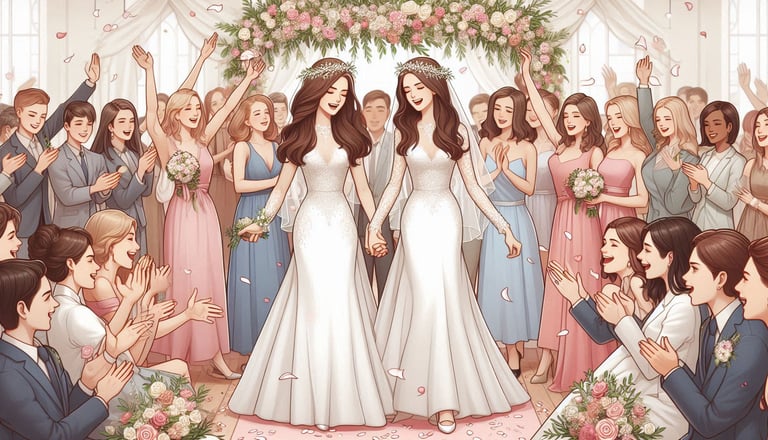Supreme Court’s Stance on Same-Sex Marriage
Aryan Harshraj
Jiwaji University, Gwalior
This blog is written by Aryan Harshraj, a Fifth-Year Law Student of Jiwaji University, Gwalior


Introduction
On October 17, a five-judge Constitution Bench of the Supreme Court comprising Judges Sanjay Kishan Kaul, Ravindra Bhat, Hima Kohli, and PS Narasimha headed by Chief Justice of India DY Chandrachud, declined to legalize same-sex marriage, taking off it to Parliament to enact on the subject. The bench held the judgment in a 3:2 decision against petitions seeking the rights for individuals of the LGBTQ community to marry and choose family. The petitions centered on the constitutionality of the Special Marriage Act, 1954. [1]
The first petition was recorded by Supriyo Chakraborty and Abhay Dang. The petitioners contend that Section 4(c) of the Act recognizes marriage as it were between a ‘male’ and a ‘female’. This segregates against same-sex couples by denying them matrimonial benefits such as selection, surrogacy, employment, and retirement benefits. The petitioners asked the Court to announce Section 4(c) of the Act as unlawful. The supplication has been labeled with several other petitions challenging other individual laws on comparable grounds. The challenged enactments incorporate the Hindu Marriage Act, 1955 and the Foreign Marriage Act, 1969.
The petitioners contend that the non-recognition of same-sex marriage violates the rights to equality, freedom of expression, and dignity. They depended on NALSA vs Union of India (2014) and Navtej Singh Johar vs. Union of India (2018) which perceived non-binary gender personalities and guaranteed equal rights to homosexual persons.[2]
On January 3rd, 2023, Senior Advocate Menaka Guruswamy and Advocate Karuna Nundy urged a 2-Judge Bench comprising CJI Chandrachud and Justice P.S. Narasimha to transfer two similar petitions pending before the Delhi & Kerala Tall Courts to the Supreme Court. The Bench agreed to list the transfer petitions along with the fundamental petition on January 6th, 2023.
On January 6th, 2023, a 3-judge Bench comprising Chief Justice D.Y. Chandrachud with Judges P.S. Narasimha and J.B. Pardiwala transferred 9 pending petitions managing with comparative issues from the Delhi and Kerala High Courts to itself.
On March 13th, 2023, a 3-judge Bench led by CJI D.Y. Chandrachud referred the case to a 5-judge Constitution Bench. This Bench started hearing the case on April 18th, 2023.
On May 11th, 2023, the 5-judge Bench reserved judgment after 10 days of hearings.
On October 17th, 2023, the 5-Judge Bench pronounced its verdict on petitions seeking marriage equality for LGBTQIA+ persons. The Bench unanimously held that there was no fundamental right to marry and that the Court might not recognize an LGBTQIA+ person's right to marry beneath the SMA.
The clump comprised twenty petitions filed by same-sex couples, transgender people, and LGBTQIA+ activists. These petitions collectively challenged the provisions of the Special Marriage Act 1954, the Hindu Marriage Act 1955, and the Foreign Marriage Act 1969.[3]
Particularly, they contended that these legislations, in their current frame, do not recognize non-heterosexual marriages, in this way perpetuating discrimination against the LGBTQIA+ community. Amid the course of the hearings, the bench had expressed willingness to constitute a committee to look at whether certain lawful rights may be granted to same-sex and queer couples, without lawful recognition of their relationship as a "marriage". [3]
This was in reaction to a query raised by the Court if certain executive instructions might be issued to ensure that same-sex and queer couples have got to welfare measures and social security - such as permission to open joint bank accounts, to name a partner as a nominee in life insurance policies, PF, pension, etc. Senior Advocate Rakesh Dwivedi contended for the State of Madhya Pradesh in opposition to the petitions. Senior Advocates Kapil Sibal and Arvind Datar moreover contended contradicting the petitions.[4]
Conclusion
The Supreme Court's recent decision not to legalize same-sex marriage in India, and instead concede the matter to Parliament, highlights the ongoing complexity and sensitivity encompassing LGBTQIA+ rights in the nation. Whereas the court recognized that same-sex couples ought to have certain legitimate rights, it stopped short of certifying marriage as a constitutional right for these people. The 3:2 split decision and the accompanying recommendation to investigate welfare measures through executive implies reflect the nuanced approach the legal has taken. These administering underscores the proceeding talk about equality, individual freedoms, and societal standards, with Parliament presently poised to potentially address these squeezing issues in the future. The battle for full marriage equality remains unresolved, but the lawful and social conversation proceeds, driven by the perseverance of LGBTQIA+ activists and supporters.
Reference
[2]https://www.scobserver.in/cases/plea-for-marriage-equality/
